#brian raftery
Text
Russell wasn't quite finished with the past. Neither was the soon-to-be forty-third president of the United States. "He comes to shake my hand," says Russell. "And I say, 'I'm editing a movie right now that's going to question your father's legacy in Iraq.'"
Bush smiled widely, still gripping the director's hand. "Well," he said, "I guess I'm going to have to go back there and finish the job."
This exchange (after a private campaign event at then-WB co-chair Terry Semel's home) from Best. Movie. Year. Ever. is almost certainly a self-flattering fabulation from David O. Russell's two-decade post facto interview with author Brian Raftery.
On the other hand, it is extremely easy to believe GWB said this on June 30, 1999.
2 notes
·
View notes
Text
Bent out of Shape
Cranky, playful, and maybe just a bit cracked, THOM YORKE has channelled his anxieties into a new solo album. Join him as he ponders the future of Radiohead and the end of civilization.
by Brian Raftery / Photographs by Jack Chessum

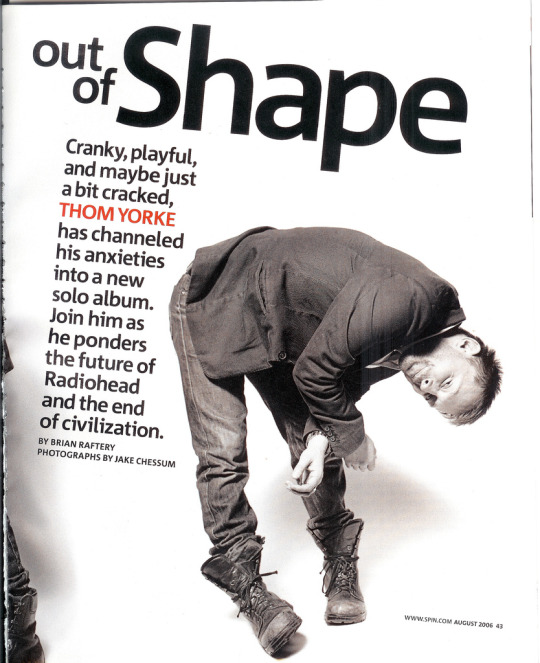
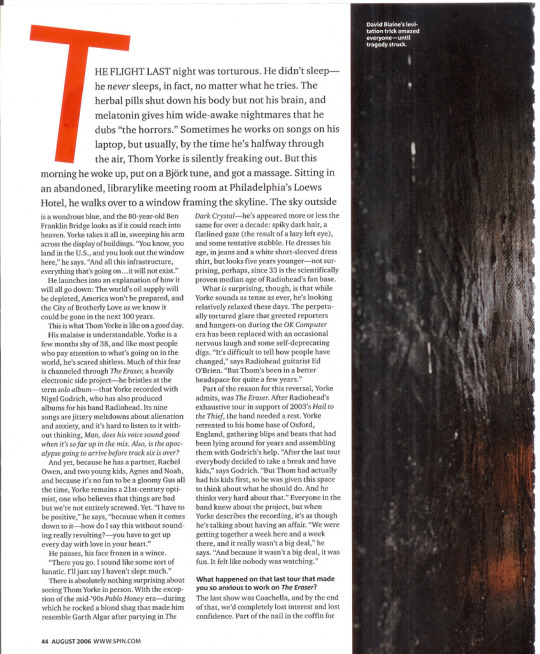

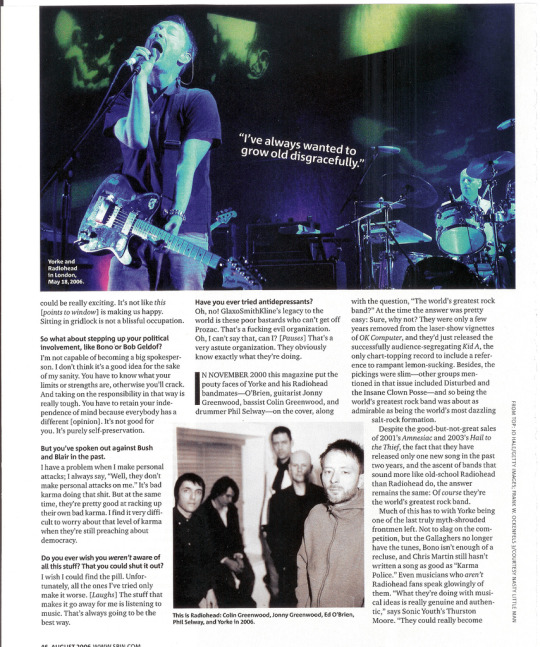
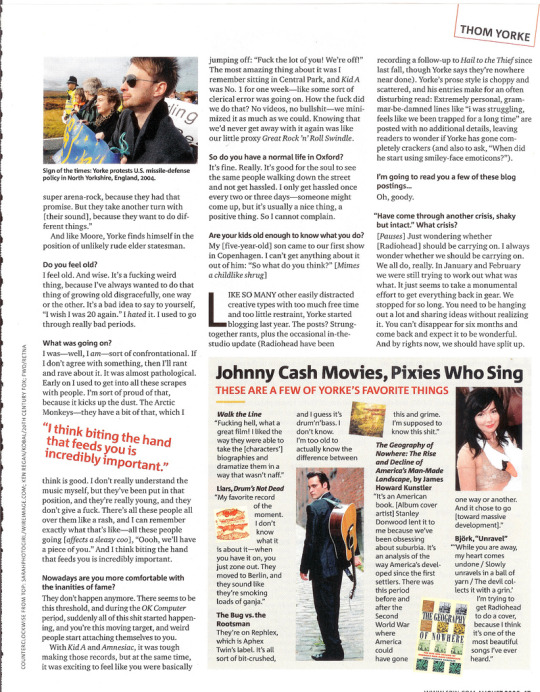
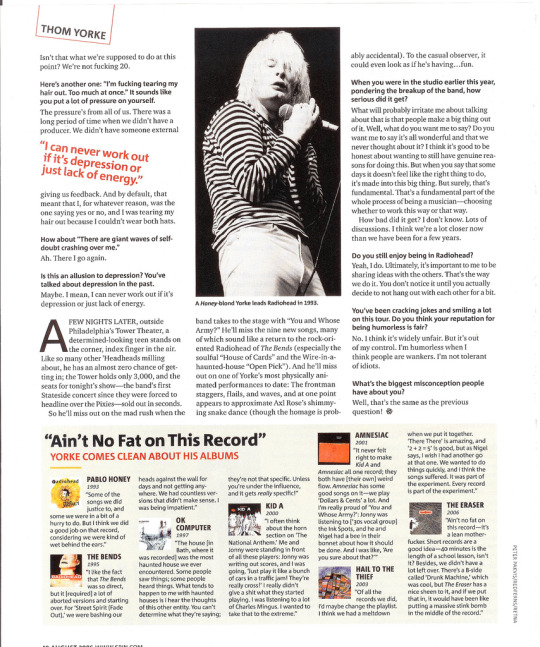
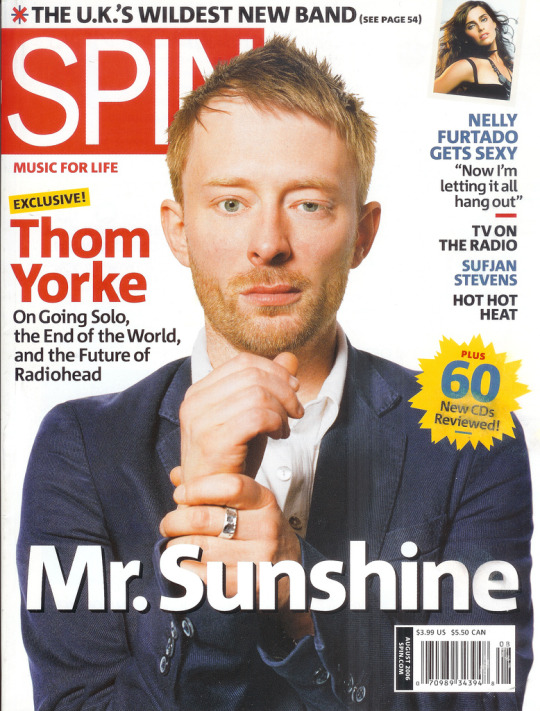
Read article. Link attached
#thome yorke#radiohead#spin magazine#2006#may 2006#Bent out of Shape#magazine article#article#brian raftery#jack chessum
1 note
·
View note
Text
Best Movie Year Ever: How 1999 Blew Up the Big Screen by Brian Raftery
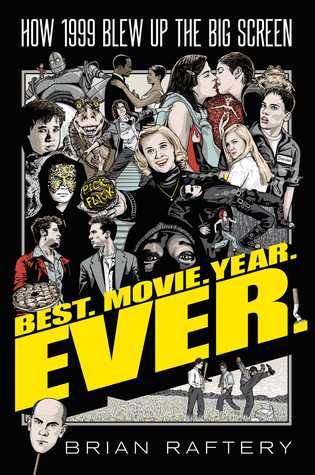
https://books.google.com/books/about/Best_Movie_Year_Ever.html?id=iDxqDwAAQBAJ
1939 is often called the greatest year in cinema for the dual release in of The Wizard of Oz and Gone with the Wind (Although 1941 would give 1939 a run for it’s money). Author Brian Raftery tries to do a similar version for the year 1999 in his book, Best Movie Year Ever: How 1999 Blew Up the Big Screen.
With 31 movies in 17 chapters, Raftery highlights the making of these movies. Each chapter is either a movement (black films), a single film (The Matrix), or a common theme (George Clooney movies). There isn’t really any information or reason why these movies made the year 1999 triumph over any other year, especially compared to say 2007 which many people declare the same great of movies.
Interesting to note is how despite the glowing praise and reviews that almost all the films in this book have, many have gone to the waist side. Films such as Star Wars Episode I, which is not a good film, earns an entry here, and also yet, is more relevant and influential than most of the films included. It blows away Election in terms of anything but ‘high art’ status and nobody cares about the Iron Giant even today. This is what Raftery seems to confuse in his book. Good well reviewed films DOES NOT EQUAL greatest film year or even influential. One only has to look at the Academy Awards’ last couple of decades to see the lack of Best Picture winners and their impact or even the laughing stock highest grossing movie of all time 2009′s Avatar and the lack of change it had for anything (besides James Cameron’s bank account).
Even look at the above example I give; 1939 had those two films but what else? There was Goodbye Mr. Chips, The Private Lives of Elizabeth and Essex, Dodge City, and one of those was in color too. Young Mr. Lincoln, Stagecoach, Rules of the Game, The Roaring Twenties are really the only critical movies to have any relevance today. Compared to 1941 there was Dumbo, The Maltese Falcon, Sergent York, The Wolf Man, Sullivan’s Travels, How Green Was My Valley, The Devil and Miss Jones, and of course Citizen Kane.
Sorry about the film nerd rant but I feel that this is the book’s biggest flaw. It confuses good for influential as that is the reason most of the films discussed are included. There are very light touches of social influence and issues discussed but when the Star Wars chapter is longer than the black film section that Raftery attempts to show occurred, then we see where the book primary wants to focus.
The most honest part of the book is the opening prologue. Raftery writes on the state of the film industry during Y2K. He also includes behind the scenes of Hollywood with Brad Pitt and the cast of Fight Club in Mexico and a kidnapping that will leave readers reading on. But beyond the making of the film discussed in their respected chapters, there isn’t any sight. The lone exception is the Star Wars chapter where Raftery discusses the impact the internet had on it’s production with fan discussions and web leaks. But Raftery has to try and tie this to the then contemporary politics of 2019 Trump era, blaming the rise of Trump on these websites and users and basically tries to make an argument that this year predicted the role of the internet in today’s world, which he utterly fails at.
While the overall theory Raftery proposes collapses and it feels more like a wanna be political predication for today’s world, this book is a good read regarding the background of certain 90s movies. I will keep my copy of the book to see how the making of various movies discussed here are made. But the book is very flawed in terms of it’s thesis or social impact.
0 notes
Text

The Queen is Mad is a musical psychodrama inspired by the true story of Joanna of Castile.
Cast
Natasha Hoeberigs (Joanna)

Alan Vicary (Ferdinand)

Brian Raftery (Philip).

3 notes
·
View notes
Text
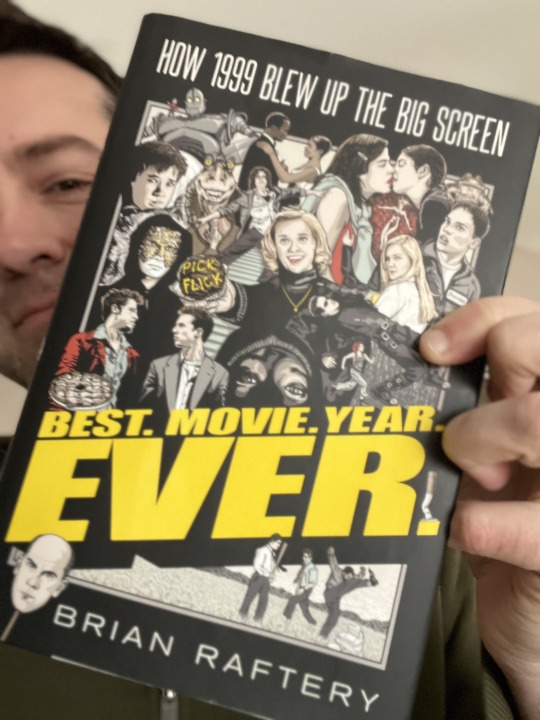
This is my favorite book that I've read lately. Brian Raftery does an incredible job not only telling the behind the scenes stories of some of the greatest films, all of which came out in 1999, but expertly weaves in what was happening in the world at the time and the cultural and social impact that many continue to carry today.
0 notes
Link
The time frame that Raftery imposes on neo-noirs (’89-’01) is a little dubious given the popularity of the noir-adjacent erotic thrillers of the 80′s but this is otherwise a very nice piece.
8 notes
·
View notes
Photo

“I couldn’t be more opposite [than Jesse Pinkman], other than the fact that I wear my heart on my sleeve. I don’t bury anything.”
– from 95 Minutes With Aaron Paul by Brian Raftery, Vulture
#breaking bad#el camino#article#vulture#aaron paul#jesse pinkman#interview#brian raftery#jay l. clendenin#portait
52 notes
·
View notes
Text
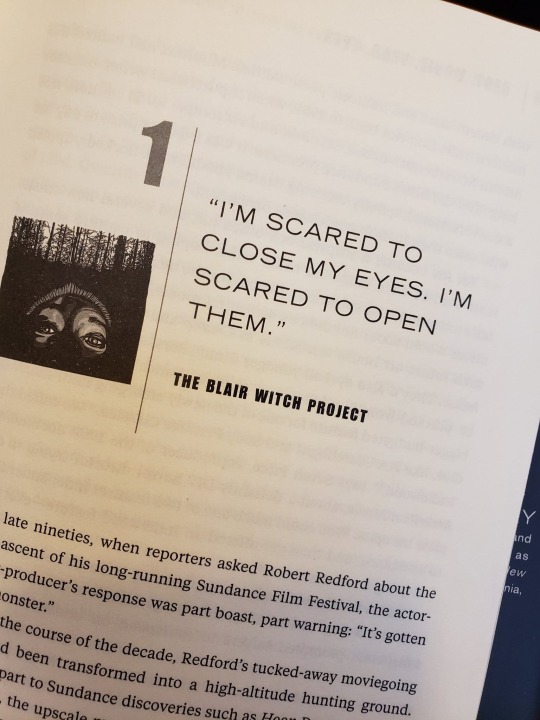
Good read — best movie year EVER - 1999
6 notes
·
View notes
Text
Best Podcasts of 2021
Best Podcasts of 2021
(more…)

View On WordPress
#365 Stories I Want To Tell You Before We Both Die#Alex Blumberg#American Scandal#Angela Duckworth#Ben Folds#Betty Robinson#Bob Saget#Brian Raftery#Caveh Zahedi#Chris Gethard#Day X#Gene and Roger#Hollywood Handbook#How to Save a Planet#I Spy#Invisibilia#Jill Lepore#Katrin Bennhold#Kevin Moffett#Lighting Bugs#Lindsay Graham#Nate DiMeo#No Stupid Questions#Rough Translation#Steven Dubner#The Final Chapters of Richard Brown Winters#The Last Archive#This is Uncomfortable
0 notes
Photo
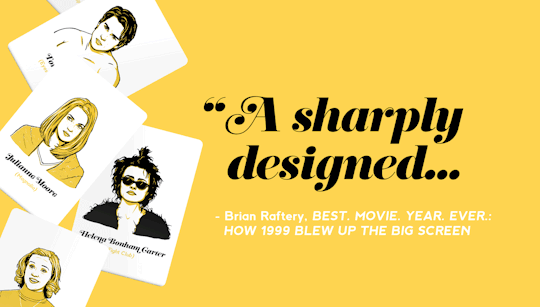
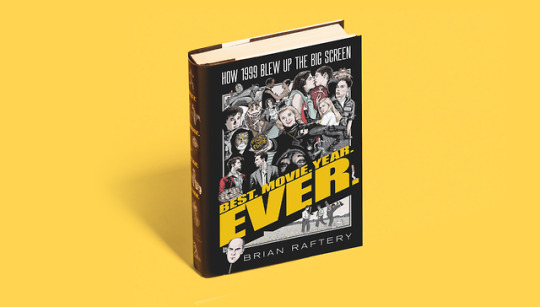
“A sharply designed, admirably nerdy movie-knowledge game that I greatly enjoyed playing — and not just because of all the 1999 cameos!” - Brian Raftery, author BEST. MOVIE. YEAR. EVER.: HOW 1999 BLEW UP THE BIG SCREEN
#film#quotes#1999#cinephile#game#cinephile game#cinephile: a card game#criterion collection#best movie year ever#Brian raftery
0 notes
Link
Best. Movie. Year. Ever.: How 1999 Blew Up the Big Screen by Brian Raftery https://amzn.to/2QAxLYE
#1999#Brian Raftery#movies#cinema#hollywood#books#book review#Best. Movie. Year. Ever.: How 1999 Blew Up the Big Screen
1 note
·
View note
Text
Brian Raftery on the missing context in war movies
"Even if they are imperfect histories, they get you started on history."
Brian Raftery and I discuss the missing geopolitical context in war movies and the difficulty incorporating it into a film without boring the audience.
Listen to our full conversation - https://open.spotify.com/episode/4NppzPWCg4sCWsanpKEJkn
0 notes
Text
Bent out of Shape
Cranky, playful, and maybe just a bit cracked, THOM YORKE has channelled his anxieties into a new solo album. Join him as he ponders the future of Radiohead and the end of civilization.
by Brian Raftery / Photographs by Jack Chessum


THE FLIGHT LAST night was torturous. He didn't sleep—he never sleeps, in fact, no matter what he tries. The herbal pills shut down his body but not his brain, and melatonin gives him wide-awake nightmares that he dubs "the horrors." Sometimes he works on songs on his laptop, but usually, by the time he's halfway through the air, Thom Yorke is silently freaking out. But this morning he woke up, put on a Björk tune, and got a massage. Sitting in an abandoned, librarylike meeting room at Philadelphia's Loews Hotel, he walks over to a window framing the skyline. The sky outside is a wondrous blue, and the 80-year-old Ben Franklin Bridge looks as if it could reach into heaven. Yorke takes it all in, sweeping his arm across the display of buildings. "You know, you land in the U.S., and you look out the window here," he says. "And all this infrastructure, everything that's going on... it will not exist."
He launches into an explanation of how it will all go down: The world's oil supply will be depleted, American won't be prepared, and the City of Brotherly Love as we know it could be gone in the next 100 years.
This is what Thom Yorke is like on a good day.
His malaise is understandable. Yorke is a few months shy of 38, and like most people who pay attention to what's going on in the world, he's scared shitless. Much of this fear is channelled through The Eraser, a heavily electronic side project—he bristles at the term solo album—that Yorke recorded with Nigel Godrich, who has also produced albums for his band Radiohead. Its nine songs are jittery meltdowns about alienation and anxiety, and it's hard to listen to it without thinking, Man, does his voice sound good when it's so far up in the mix. Also, is the apocalypse going to arrive before track six is over?
And yet, because he has a partner, Rachel Owen, and two young kids, Agnes and Noah, and because it's no fun to be a gloomy Gus all the time, Yorke remains a 21st-century optimist, one who believes that things are bad but we're not entirely screwed. Yet, "I have to be positive," he says, "because when it comes down to it—how do I say this without sounding really revolting?—you have to get up every day with love in your heart."
He pauses, his face frozen in a wince.
"There you go. I sound like some sort of lunatic. I'll just say I haven't slept much."
There is absolutely nothing surprising about seeing Thom Yorke in person. With the exception of the mid '90s Pablo Honey era—during which he rocked a blond shag that made him resemble Garth Algar after partying in The Dark Crystal—he's appeared more or less the same for over a decade: spiky dark hair, a flatlined gaze (the result of a lazy left eye), and some tentative stubble. He dresses his age, in jeans and a white short-sleeved dress shirt, but looks five years younger—not surprising, perhaps, since 33 is the scientific proven median age of Radiohead's fan base.
What is surprising, though, is that while Yorke sounds as tense as ever, he's looking relatively relaxed these days. The perpetually tortured glare that greeted reporters and hangers-on during the OK Computer era has been replaced by an occasional nervous laugh and some self-deprecating digs. "It's difficult to tell how people have changed," says Radiohead guitarist Ed O'Brien. "But Thom's been in a better headspace for quite a few years."
Part of the reason for this reversal, Yorke admits, was The Eraser. After Radiohead's exhaustive tour in support of 2003's Hail to the Thief, the band needed a rest. Yorke retreated to his home base of Oxford, England, gathering blips and beats that had been lying around for years and assembling them with Godrich's help. "After the last tour everybody decided to take a break and have kids," says Godrich. "But Thom had actually had his kids first, so he was given this space to think about what he should do. And he thinks very hard about that." Everyone in the band knew about the project, but when Yorke describes the recording, it's as though he's talking about having an affair. "We were getting together a week here and a week there, and it really wasn't a big deal," he says. "And because it wasn't a big deal, it was fun. It felt like nobody was watching."
What happened on that last tour that made you so anxious to work on The Eraser?
The last show was Coachella, and by the end of that, we'd completely lost interest and lost confidence. Part of the nail in the coffin for me, personally, was going on after the fucking Pixies. It's like going on after the Beatles. It was a massive big deal, and I really, really, really didn't want to do it. It was an odd situation, as well, because I think the Pixies misread it. They thought it was because we didn't like them. I lost sleep for a month. It was time to stop for a bit.
What happened when you stopped?
The interesting thing was the lack of momentum, the lack of doing anything. You just sort of go into this loop where you're like, "Ahhhh, fucking hell," because nothing's done. Unless you finish a song, you can't move on. That's what was the good thing about The Eraser, going bang, bang, bang, bang, bang, and it was done. I want to get a bit of that bang, bang, bang, bang thing back again.
Making The Eraser may have been cathartic, but it's a very bleak record. There are songs about distrust, isolation, bombs in the Underground...
I have many bleak thoughts. Don't get me started, man, It's one f my specialties, apparently. I'm concerned for our future, generally speaking. I'm concerned for my children's future. The reason I called it The Eraser is because the whole thing was written just trying to forget all the things that scare me. For example, we've reached the point where the [oil] supply has peaked. So what's going to happen? It's this enormous fucking elephant in the room, and everybody in the Western world is ignoring it. It's insane. And me being me, I don't ignore it. I guess I have too much time on my hands. So yeah, big surprise that I happen to be writing about that.
How do you keep those things in mind and not have it weigh down your life?
I have periods like that, which probably means I should be [institutionalized]. But I'm not a pessimist. I've gotten involved with this Friends of the Earth [group]: in the U.K. they're a big thing, like Greenpeace. They have this campaign to get the government to reduce carbon emissions by 60 percent by 2050 or something like that. And it's quite interesting to be sitting down with these people, and them actually saying, "These things are achievable."
We've got 50 years to reassess how we interact with the world around us. And it could be really exciting. It's not like this [points to window] is making us happy. Sitting in gridlock is not a blissful experience.
So what about stepping up your political involvement, like Bono or Bob Geldof?
I'm not capable of becoming a big spokesperson. I don't think it's a good idea for the sake of my sanity. You have to know what your limits or strengths are, otherwise you'll crack. And taking on the responsibility in that way is really tough. You have to retain your independence of mind because everybody has a different [opinion]. It's not good for you. It's purely self-preservation.
But you've spoken out against Bush and Blair in the past.
I have a problem when I make personal attacks. I always say, "Well, they don't make personal attacks on me." It's bad karma doing that shit. But at the same time, they're pretty good at racking up their own bad karma. I find it very difficult to worry about that level of karma when they're still preaching about democracy.
Do you ever wish you weren't aware of all this stuff? That you could shut it out?
I wish I could find the pill. Unfortunately, all the ones I've tried only make it worse. [Laughs] The stuff that makes it go away for me is listening to music. That's always going to be the best way.
Have you ever tried antidepressants?
Oh, no! GlaxoSmithKline's legacy to the world is these poor bastards who can't get off Prozac. That's a fucking evil organization. Oh, I can't say that, can I? [Pauses] That's a very astute organization. They obviously know exactly what they're doing.
IN NOVEMBER 2000 this magazine put the pouty faces of Yorke and his bandmates—O'Brien, guitarist Jonny Greenwood, bassist, Colin Greenwood, and drummer Phil Selway—on the cover, along with the question, "The world's greatest rock band?" At the time the answer was pretty easy: Sure, why not? They were only a few years removed from the laser-show vignettes of OK Computer, and they'd just released the successfully audience-segregating Kid A, the only chart-topping record to include a relevance to rampant lemon-sucking. Besides, the pickings were slim—other groups mentioned in that issue included Disturbed and the Insane Clown Posse—and so being the world's greatest rock band was about as admirable as being the world's most dazzling salt-rock formation.
Despite the good-but-not-great sales of 2001's Amnesiac and 2003's Hail to the Thief, the fact that they have released only one new song in the past two years, and the ascent of bands that sound more like old-school Radiohead than Radiohead do, the answer remains the same: Of course they're the world's greatest rock band.
Much of this has to do with Yorke being one of the last truly myth-shrouded frontmen left. Not to slag on the competition, but the Gallaghers no longer have the tunes, Bono isn't enough of a recluse, and Chris Martin still hasn't written a song as good as "Karma Police." Even musicians who aren't Radiohead fans speak glowingly of them. "What they're doing with musical ideas is really genuine and authentic," says Sonic Youth's Thurston Moore. "They could really become super arena-rock, because they had that promise. But they take another turn with [their sound], because they want to do different things.
And like Moore, Yorke finds himself in the position of unlikely rude elder statesman.
Do you feel old?
I feel old. And wise. It's a fucking weird thing, because I've always wanted to do that thing of growing old disgracefully, one way or the other. It's a bad idea to say to yourself, "I wish I was 20 again." I hated it. I used to go through really bad periods.
What was going on?
I was—well, I am—sort of confrontational. If I don't agree with something, then I'll rant and rave about it. It was almost pathological. Early on I used to get into all these scrapes with people. I'm sort of proud of that, because it kicks up the dust. The Arctic Monkeys—they have a bit of that, which I think is good. I don't really understand the music myself, but they've been put in that position, and they're really young, and they don't give a fuck. There's all these people all over them like a rash, and I can remember exactly what that's like—all these people going [affects a sleazy coo], "Oooh, we'll have a piece of you." And I think biting the hand that feeds you is incredibly important.
Nowadays are you more comfortable with the inanities of fame?
They don't happen anymore. There seems to be this threshold, and during the OK Computer period, suddenly all this shit started happening, and you're this moving target, and weird people start attaching themselves to you.
With Kid A and Amnesiac, it was tough making those records, but at the same time, it was exciting to feel like you were basically jumping off: "Fuck the lot of you! We're off!" The most amazing thing about it was I remember sitting in Central Park, and Kid A was No. 1 for one week—like some sort of clerical error was going on. How the fuck did we do that? No videos, no bullshit—we minimized it as much as we could. Knowing that we'd never get away with it again was like our little proxy Great Rock 'n' Roll Swindle.
So do you have a normal life in Oxford?
It's fine. Really. It's good for the soul to see the same people walking down the street and not get hassled. I only get hassled once every two or three days—someone might come up, but it's usually a nice thing, a positive thing. So I cannot complain.
Are your kids old enough to know what you do?
My [five-year-old] son came to our first show in Copenhagen. I can't get anything about it out of him: "So what do you think?" [Mimes a childlike shrug]
LIKE SO MANY other easily distracted creative types with too much free time and too little restraint, Yorke started blogging last year. The posts? Strung-together rants, plus the occasional in-the-studio update (Radiohead have been recording a follow-up to Hail to the Thief since last fall, though Yorke says they're nowhere near done). Yorke's prose style is choppy and scattered, and his entries make for an often disturbing read: Extremely personal, grammar-be-damned lines like "I was struggling, feels like we been trapped for a long time" are posted with no additional details, leaving readers to wonder if Yorke has gone completely crackers (and also to ask, "When did he start using smiley-face emoticons?").
I'm going to read you a few of these blog postings...
Oh, goody.
"Have come through another crisis, shaky but intact." What crisis?
[Pauses] Just wondering whether [Radiohead] should be carrying on. I always wonder whether we should be carrying on. We all do, really. In January and February we were still trying to work out what was what. It just seems to take a monumental effort to get everything back in gear. We stopped for so long. You need to be hanging out a lot and sharing ideas without realizing it. You can't disappear for six months and come back and expect it to be wonderful. And by rights now, we should have split up. Isn't that what we're fucking supposed to do at this point? We're not fucking 20.
Here's another one: "I'm fucking tearing my hair out. Too much at once." It sounds like you put a lot of pressure on yourself.
The pressure's from all of us. There was a long period of time when we didn't have a producer. We didn't have someone external giving us feedback. And by default, that meant that I, for whatever reason, was the one saying yes or no, and I was tearing my hair out because I couldn't wear both hats.
How about "There are giant waves of self-doubt crashing over me."
Ah. There I go again.
Is this an allusion to depression? You've talked about depression in the past.
Maybe. I mean, I can never work out if it's depression or just lack of energy.
A FEW NIGHTS LATER, outside Philadelphia's Tower Theatre, a determined-looking teen stands on the corner, index finger in the air. Like so many other 'Headheads milling about, he has an almost zero chance of getting in; the Tower holds only 3,000, and the seats for tonight's show—the band's first Stateside concert since they were forced to headline over the Pixies—sold out in seconds.
So he'll miss out on the mad rush when the band takes to the stage with "You and Whose Army?" He'll miss the nine new songs, many of which sound like a return to the rock-oriented Radiohead of The Bends (especially the soulful "House of Cards" and the Wire-in-a-haunted-house "Open Pick"). And he'll miss out on one of Yorke's most physically animated performances to date: the frontman staggers, flails, and waves, and at one point appears to approximate Axl Rose's shimmying snake dance (thought the homage is probably accidental). To the casual observer, it could even look as if he's having... fun.
When you were in the studio earlier this year, pondering the breakup of the band, how serious did it get?
What will probably irritate me about talking about that is that people make a big thing out of it. Well, what do you want me to say? Do you want me to say it's all wonderful and that we never thought about it? I think it's good to be honest about wanting to still have genuine reasons for doing this. But when you say that some days it doesn't feel like the right thing to do, it's made into this big thing. But surely, that's fundamental. That's a fundamental part of the whole process of being a musician—choosing whether to work this way or that way.
How bad did it get? I don't know. Lots of discussions. I think we're a lot closer now than we have been for a few years.
Do you still enjoy being in Radiohead?
Yeah, I do. Ultimately, it's important to me to be sharing ideas with the others. That's the way we do it. You don't notice it until you actually decide to not hang out with each other for a bit.
You've been cracking jokes and smiling a lot on this tour. Do you think your reputation for being humourless is fair?
No. I think it's widely unfair. But it's out of my control. I'm humourless when I think people are wankers. I'm not tolerant of idiots.
What's the biggest misconception people have about you?
Well, that's the same as the previous question!
Johnny Cash Movies, Pixies Who Sing
THESE ARE A FEW OF YORKE'S FAVOURITE THINGS
Walk the Line
"Fucking hell, what a great film! I liked the way they were able to take the [characters'] biographies and dramatize them in a way that wasn't naff."
Liars, Drum's Not Dead
"My favourite record of the moment. I don't know what it is about it—when you have it on, you just zone out. They moved to Berlin, and they sound like they're smoking loads of ganja."
The Bug vs. the Rootsman
They're on Rephlex, which is Aphex Twin's label. It's all sort of bit-crushed, and I guess it's drum'n'bass. I don't know. I'm too old to actually know the difference between this and grime. I'm supposed to know this shit."
The Geography of Nowhere: The Rise and Decline of America's Man-Made Landscape, by James Howard Kunstler
"It's an American book. [Album cover artist] Stanley Donwood lent it to me because we've been obsessing about suburbia. It's an analysis of the way America's developed since the first settlers. There was this period before and after the Second World War where America could have gone one way or another. And it chose to go [toward massive development]."
Björk, "Unravel"
"While you are away, my heart comes undone/Slowly unravels in a ball of yarn/The devil collects it with a grin." I'm trying to get Radiohead to do a cover, because I think it's one of the most beautiful songs I've ever heard."
"Ain't No Fat on This Record"
YORKE COMES CLEAN ABOUT HIS ALBUMS
PABLO HONEY
1993
"Some of the songs we did justice to, and some we were in a bit of a hurry to do. But I think we did a good job on that record, considering we were kind of wet behind the ears."
THE BENDS
1995
"I like the fact that The Bends was so direct, but it [required] a lot of aborted sessions and starting over. For 'Street Spirit [Fade Out]', we were bashing our heads against the wall for days and not getting anywhere. We had countless versions that didn't make sense. I was being impatient."
OK COMPUTER
1997
"The house [in Bath, where it was recorded] was the most haunted house we ever encountered. Some people saw things, some people heard things. What tends to happen to me with haunted houses is I hear the thoughts of this other entity. You can't determine what they're saying; they're not that specific. Unless you're under the influence, and it gets really specific!"
KID A
2000
"I often think about the horn section on ‘The National Anthem'. Me and Jonny were standing in front of all these players; Jonny was writing out scores, and I was going, ‘Just play it like a bunch of cars in a traffic jam! They're really cross!' I really didn't give a shit what they started playing. I was listening to a lot of Charles Mingus. I wanted to take that to the extreme."
AMNESIAC
2001
"It never felt right to make Kid A and Amnesiac all one record; they both have [their own] weird flow. Amnesiac has some good songs on it—we play ‘Dollars & Cents' a lot. And I'm really proud of ‘You and Whose Army?': Jonny was listening to [30s vocal group] the Ink Spots, and he and Nigel had a bee in their bonnet about how it should be done. And I was like, ‘Are you sure about that?"
HAIL TO THE THIEF
2003
"Of all the records we did, I'd maybe change the playlist. I think we had a meltdown when we put it together. ‘There There' is amazing, and ‘2+2=5' is good, but as Nigel says, I wish I had another go at that one. We wanted to do things quickly, and I think the songs suffered. It was part of the experiment. Every record is part of the experiment."
THE ERASER
2006
"Ain't no fat on this record — it's a lean motherfucker. Short records are a good idea—40 minutes is the length of a school lesson, isn't it? Besides, we didn't have a lot left over. There's a B-side called ‘Drunk Machine,‘ which was cool, but The Eraser has a nice sheen to it, and if we put that in, it would have been like putting a massive stink bomb in the middle of the record."
Troubled Man
Confusion reigns on the Radiohead leader's solo debut [3 out of 5 stars]
by Jon Dolan / Photo-Illustration by Joe Magee
Rock music is based on a symbiotic relationship between artist and audience: They do whatever they want, we think it's genius. Get coked up and drive your car into a rehab clinic? Genius. Sober up and sit around a castle IM'ing with the Dalai Lama while a sexy robot maid rubs your temples? More genius. But some rock gods don't play that game, and Thom Yorke is one of them. The career of the Radiohead frontman has been an ongoing process of building a strange, maybe unprecedented empathy between a musical icon and his teeming minions.
Throw on any Radiohead album since 1997's OK Computer rewrote the book on stadium-rock alienation. Each is a little black pool of prog-rock drift where Yorke marinades his ego until it nearly dissolves, leaving him and the listener in a liberating state of disorientation. The woozier the vertigo, the deeper the bond. Now he's also got a blog (www.radiohead.com/deadairspace/) where he can share his most personal, tortured thoughts. Celebrities get rich commodifying their elusive inner beauty, but Yorke's freebie outpourings are kind of subversive.
The Eraser, a stopgap en route to the next Radiohead album (due in 2007), offers nine excursions into ambient neurosis that only heighten that shared sense of confusion. The skittery, out-of-focus beats and electronica brutalism are unsettling, and Yorke's dire musings are more obtuse than ever. But for him, that's just honesy, and this is his most personal, confessional work (Yorke created all the songs with producer Nigel Godrich). Call it a blog with beats--low on guitars and high on abstract expressive moodiness. "The more you try to erase me, the more that I appear/The more I try to erase you, the more that you appear," he yelps above the blurry piano on the title track, before the tension breaks with an almost humane house-music groove. It's one of the few moments when his body takes precedence over his troubled mind.
These are the weirdest tracks Yorke has ever been a part of; even devotees of Radiohead guitarist Jonny Greenwood's comparatively pleasant orchestral outing, Bodysong, may be a little freaked out at first. "Analyse" suggests Swan Lake performed on a hot plate, and "Skip Divided" is like an EKG machine humming old soul tunes. Echoing Radiohead, these songs dwell in the space where everyday communication fails, and we have to look deeper or look away. But Yorke's ability to make alienation seem reassuring--what he refers to here as his "elliptical caress"--always draws you in. Whether he's singing about his childhood or postmodern apathy or math or rain, his drippiest distress calls sound like gospel. Even if he's going nowhere in particular, you can't help but tag along.
3 notes
·
View notes
Text
Books that I’ve Read
Here is all the new movies that I consumed in the year of 2022. I only put here the new items that I previously never have experienced before. Listed in the order that I saw them in. Lets hope that 2023’s list is greater.
Books
Empire of Mud: The Secret History of Washington, DC by J.D. Dickey REVIEW
Convenience Store Woman by Sayaka Murata REVIEW
Bury My Heart At Wounded Knee: An Indian History of the American West by Dee Brown REVIEW
The Incredible Shrinking Man by Richard Matheson REVIEW
To Hell and Back by Audie Murphy REVIEW
The China Mission: George Marshall’s Unfinished War, 1945-1947 by Daniel Kurtz-Phelan REVIEW
When Books Went to War by Molly Guptill Manning REVIEW
A Cool Breeze on the Underground by Don Winslow REVIEW
Nights of the Living Dead Anthology edited by Jonathan Maberry and George A. Romero REVIEW
Goosebumps Slappyworld The Dummy Meets the Mummy by R.L. Stine REVIEW
Dutch Girl: Audrey Hepburn and World War II by Robert Matzen REVIEW
The Long Affair: Thomas Jefferson and the French Revolution, 1785-1800 by Conor Cruise O’Brien REVIEW
Killing a King: The Assassination of Yitzhak Rabin and the Remaking of Israel by Dan Ephron REVIEW
My Best Friend’s Exorcism by Grady Hendrix REVIEW
63 Documents the Government Doesn’t Want You to Read by Jess Ventura and Dick Russell REVIEW
Follow Me Down by Shelby Foote REVIEW
Negro President: Jefferson and the Slave Power by Garry Wills REVIEW
Thomas Jefferson: The Art of Power by Jon Meacham REVIEW
I Am Legend by Richard Matheson REVIEW
Trotsky in New York 1917 by Kenneth D. Ackerman REVIEW
Out of the Silent Planet by C.S. Lewis REVIEW
Perelandra by C.S. Lewis REVIEW
That Hideous Strength by C.S. Lewis
The Burning Edge: Travels Through Irradiated Belarus by Arthur Chichester REVIEW
Paperbacks from Hell by Grady Hendrix REVIEW
Kingfish: The Reign of Huey P. Long by Richard D. White Jr. REVIEW
Best Movie Year Ever: How 1999 Blew Up the Big Screen by Brian Raftery REVIEW
Lost in a Good Game: Why We Play Video Games and What They Can Do for Us by Pete Etchells
Conquistadors by Michael Wood
Humanity: How Jimmy Carter Lost an Election and Transformed the Post-Presidency by Jordan Michael Smith
The Captured: A True Story of Abduction of Indians on the Texas Frontier by Scott Zesch REVIEW
Jaws by Peter Benchley
Pimp: The Story of My Life by Iceberg Slim REVIEW
1920: The Year That Made The Decade Roar by Eric Burns REVIEW
The Other Hollywood: The Uncensored Oral History of the Porn Film Industry by Legs McNeil and Jennifer Osborne REVIEW
Black Cop’s Kid: An Essay by Kareem Abdul-Jabbar REVIEW
The Awkward Thoughts of W. Kamau Bell by W. Kamau Bell REVIEW
Maestro Mario: How Nintendo Transformed Videogame Music into an Art by Andrew Schartmann REVIEW
The Story of Jane: The Legendary Underground Feminist Abortion Service by Laura Kaplan REVIEW
The Last Conversation by Paul Tremblay REVIEW
3 notes
·
View notes
Text
Pop Culture Happy Hour: John Wick: Chapter 3 — Parabellum and What's Making Us Happy
Pop Culture Happy Hour: John Wick: Chapter 3 — Parabellum and What’s Making Us Happy
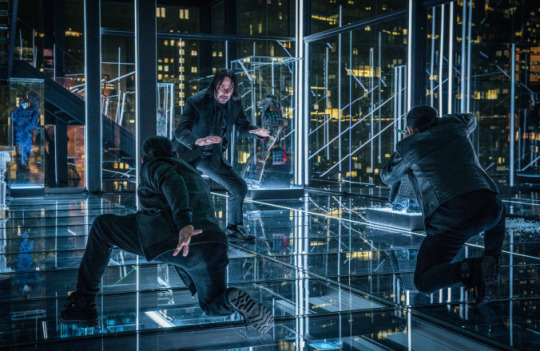
Yayan Ruhian and Cecep Arif Rahman face off against Johnny Utah (center).
What a treat to dissect the third and gnarliest John Wick with Linda and Glen and Aisha Harris.
While recommending Brian Raftery’s Best. Movie. Year. Ever: How 1999 Blew Up the Big Screen, I happened to name one of my most be-loathed movies from that year, the Best Picture-winning American Beauty, while omitting…
View On WordPress
#Aisha Harris#Brian Raftery#Chad Stahelski#Glen Weldon#Jessica Reedy#John Wick#Keanu Reeves#Linda Holmes#Pop Culture Happy Hour
0 notes
Photo

Siskel & Ebert Narrative Podcast Series Set At Spotify From Brian Raftery & The Ringer
EXCLUSIVE: Gene Siskel and Roger Ebert are to be the subject of a narrative documentary podcast series for Spotify. The audio service is launching Gene & Roger from Bill Simmon’s The Ringer and host Brian Raftery.
Subscribe to the Pop Culture Brain Daily newsletter for more stories like this!
4 notes
·
View notes